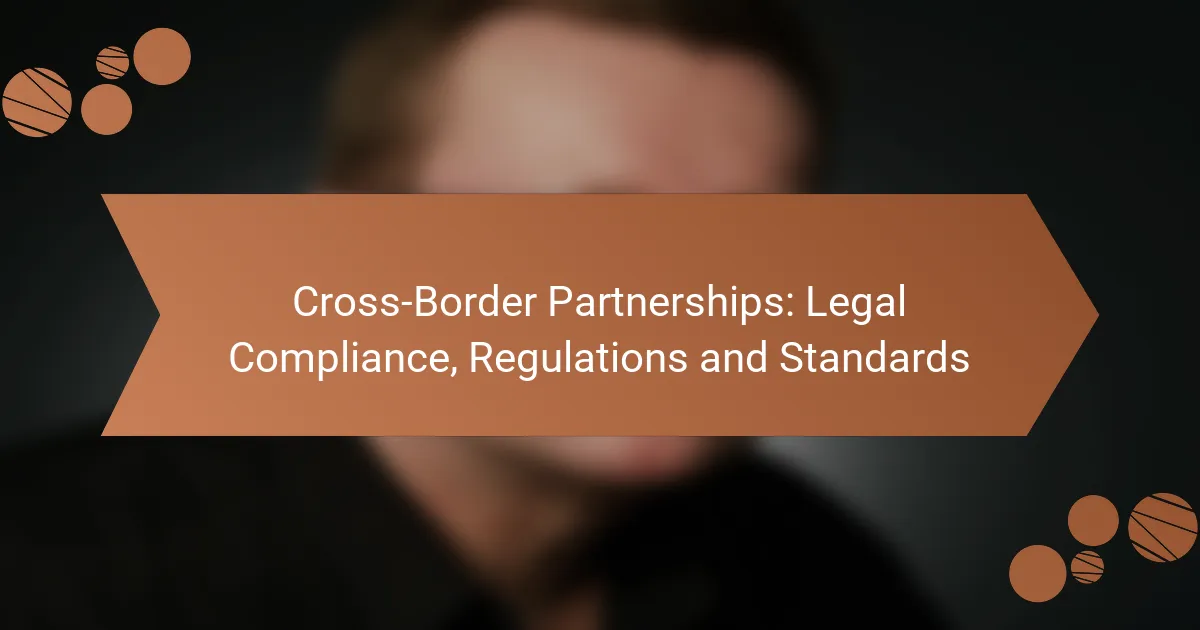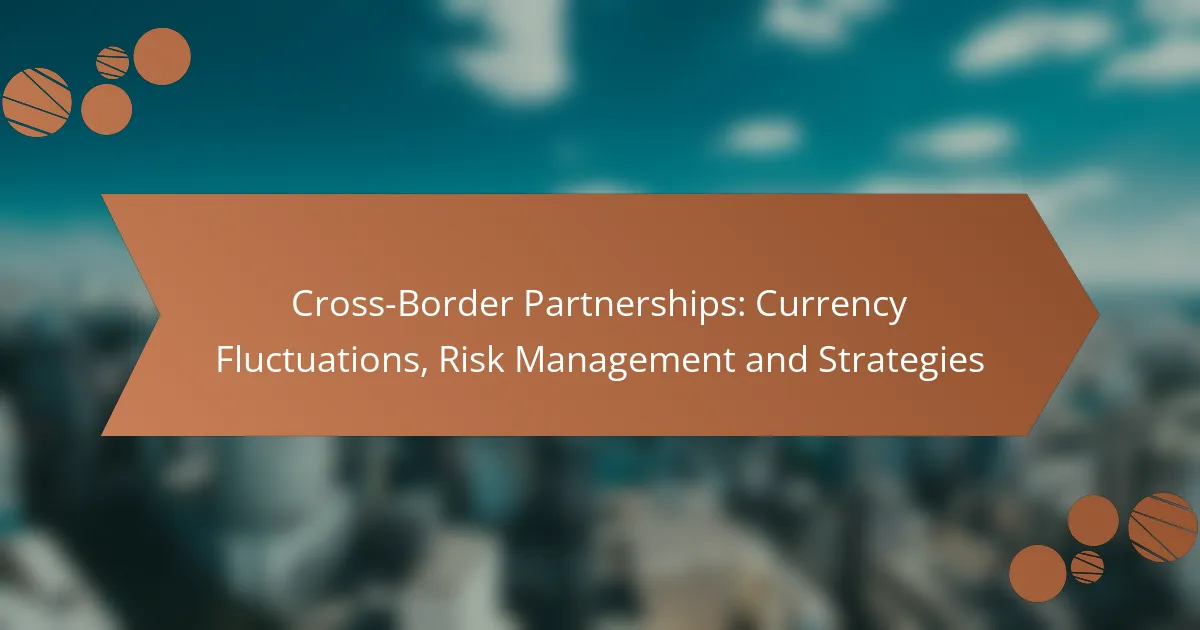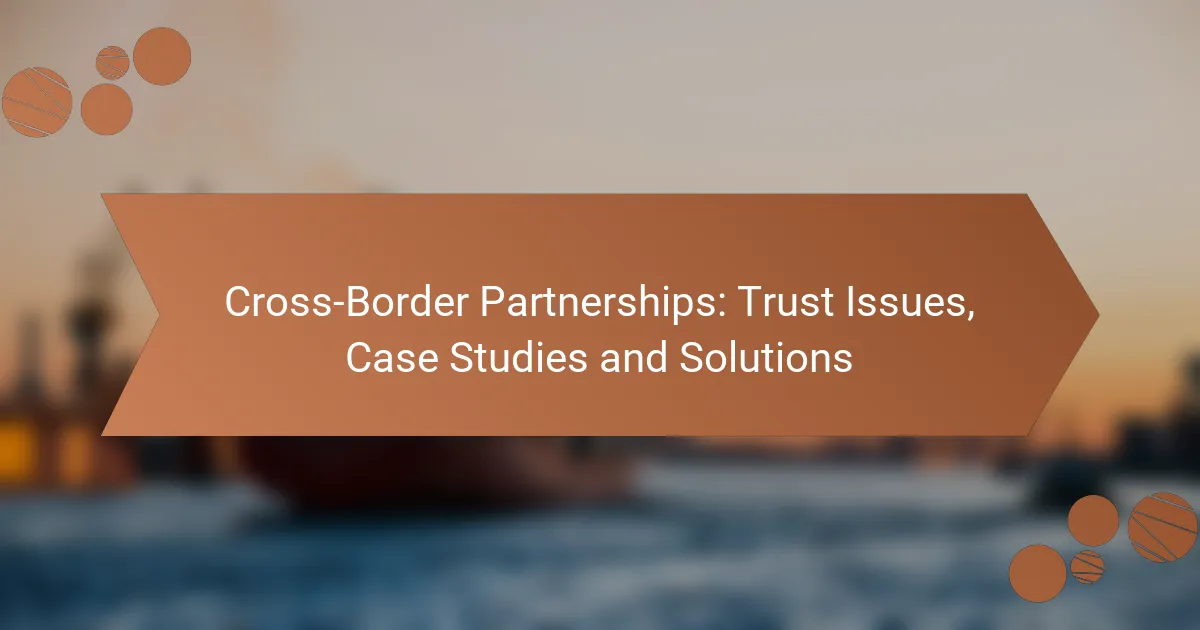Cross-border partnerships in e-commerce necessitate strict adherence to a myriad of legal compliance requirements, including regulations on international trade, data protection, and taxation. Understanding and navigating these diverse legal frameworks is crucial for businesses to avoid penalties and ensure seamless operations across borders. Additionally, meeting established standards for quality and consumer protection is essential for building trust and facilitating efficient transactions in the global marketplace.
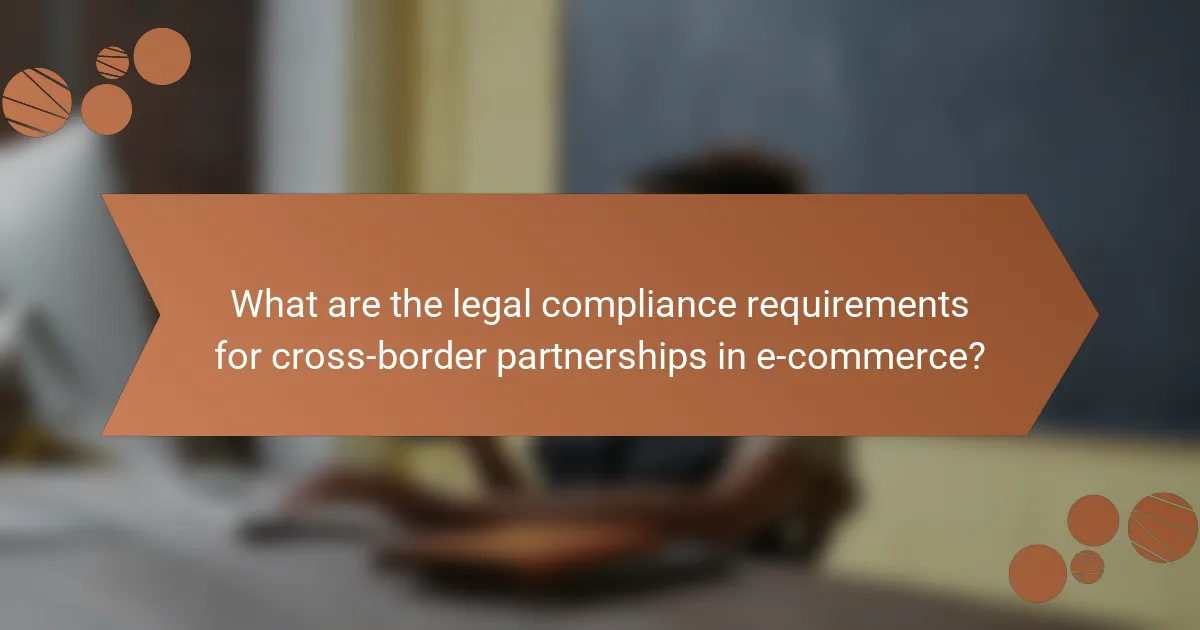
What are the legal compliance requirements for cross-border partnerships in e-commerce?
Legal compliance for cross-border partnerships in e-commerce involves adhering to various regulations and standards that govern international trade, data protection, taxation, and intellectual property. Businesses must navigate these requirements to ensure smooth operations and avoid legal pitfalls.
Understanding local laws
Each country has its own set of laws that govern e-commerce activities, including consumer protection, product safety, and advertising regulations. Businesses must familiarize themselves with these local laws to avoid penalties and ensure compliance.
For example, the European Union has strict consumer protection laws that require clear information about products and services. Companies operating in the EU must comply with these regulations, which may differ significantly from those in the United States or other regions.
International trade agreements
International trade agreements can significantly impact cross-border partnerships by reducing tariffs and simplifying customs procedures. Understanding these agreements, such as the USMCA or EU trade agreements, is crucial for businesses looking to expand internationally.
Companies should assess how these agreements affect their operations, including import/export duties and compliance requirements, to optimize their supply chains and reduce costs.
Data protection regulations
Data protection is a critical aspect of cross-border e-commerce, with regulations like the General Data Protection Regulation (GDPR) in the EU setting stringent standards for data handling. Businesses must ensure they comply with these regulations to protect customer data and avoid hefty fines.
Organizations should implement robust data protection measures, including obtaining consent for data collection and ensuring secure data storage and processing practices. Non-compliance can lead to significant legal repercussions and damage to reputation.
Tax obligations
Cross-border e-commerce often involves complex tax obligations, including value-added tax (VAT) and sales tax. Businesses must understand the tax regulations in each jurisdiction where they operate to ensure compliance and avoid double taxation.
For instance, the EU requires businesses to collect VAT on sales to consumers within its member states, while the US has varying state sales tax requirements. Companies should consult tax professionals to navigate these obligations effectively.
Intellectual property considerations
Intellectual property (IP) rights are vital in protecting a business’s assets in cross-border partnerships. Companies must be aware of the IP laws in each country to safeguard their trademarks, copyrights, and patents.
Filing for IP protection in multiple jurisdictions can be complex and costly, but it is essential to prevent infringement and protect brand integrity. Businesses should consider international treaties, such as the Madrid Protocol for trademarks, to streamline the process.
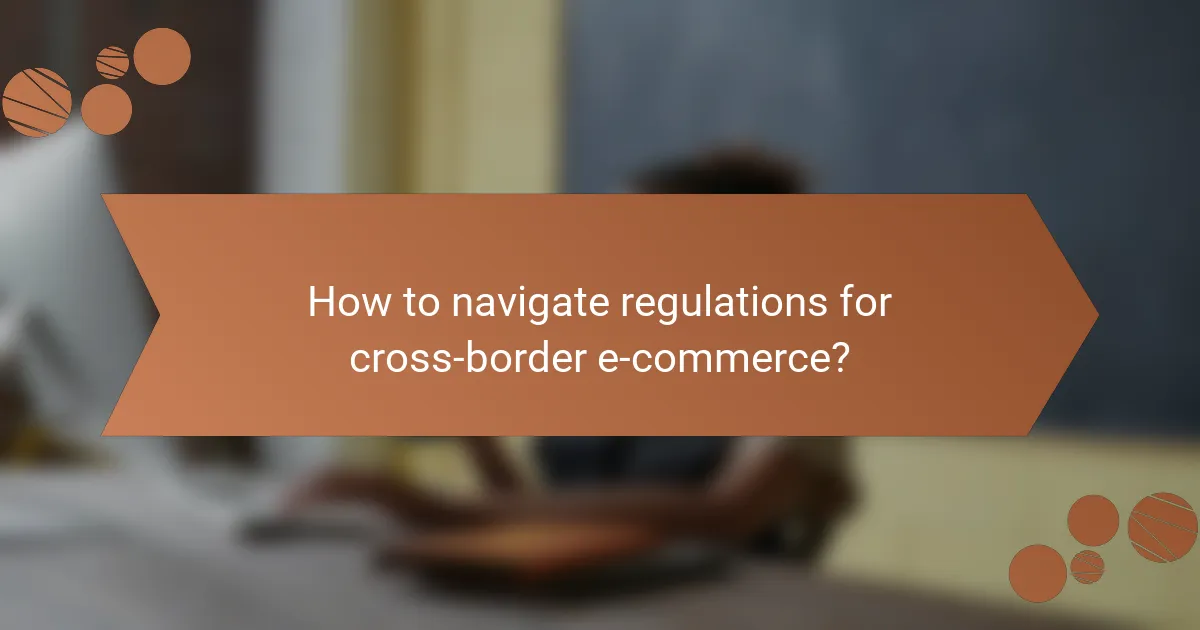
How to navigate regulations for cross-border e-commerce?
Navigating regulations for cross-border e-commerce involves understanding legal requirements, compliance standards, and customs regulations in different countries. Businesses must ensure they meet these obligations to avoid penalties and facilitate smooth transactions.
Consulting legal experts
Engaging legal experts who specialize in international trade is crucial for navigating cross-border e-commerce regulations. These professionals can provide insights into specific laws and compliance requirements in various jurisdictions, helping businesses avoid legal pitfalls.
When selecting a legal advisor, consider their experience with e-commerce and familiarity with the countries you are operating in. This expertise can save time and resources by ensuring compliance from the outset.
Utilizing compliance software
Compliance software can streamline the process of adhering to cross-border regulations by automating key tasks. These tools often include features for tracking changes in laws, managing documentation, and ensuring that all transactions meet local requirements.
Look for software that integrates with your existing e-commerce platforms and offers updates on regulatory changes. This can significantly reduce the risk of non-compliance and improve operational efficiency.
Adhering to customs regulations
Customs regulations vary widely by country and can significantly impact cross-border e-commerce. Understanding these regulations is essential for ensuring that goods are cleared efficiently and without unexpected costs.
Key considerations include knowing the correct tariff classifications, ensuring accurate documentation, and being aware of any import/export restrictions. Familiarize yourself with the customs processes of the countries you are trading with to avoid delays and additional fees.

What standards should be met for successful cross-border partnerships?
Successful cross-border partnerships require adherence to various standards that ensure quality, consumer protection, and efficient payment processing. Meeting these standards helps mitigate risks and fosters trust between partners and customers across different jurisdictions.
Quality assurance standards
Quality assurance standards are essential for maintaining product and service consistency in cross-border partnerships. These standards often include ISO certifications, which provide a framework for ensuring quality management systems are in place.
When entering a new market, partners should assess local quality standards and certifications that may be required. For example, EU partners may need to comply with CE marking requirements, while U.S. partners might focus on FDA regulations for certain products.
Consumer protection laws
Consumer protection laws vary significantly across countries and are crucial for maintaining customer trust. These laws cover aspects such as product safety, advertising practices, and data privacy, and they often dictate how businesses should interact with consumers.
For instance, the General Data Protection Regulation (GDPR) in Europe imposes strict rules on data handling, while the Federal Trade Commission (FTC) in the U.S. enforces advertising standards. Businesses must familiarize themselves with these regulations to avoid legal pitfalls.
Payment processing standards
Payment processing standards are vital for facilitating secure and efficient transactions in cross-border partnerships. Compliance with standards such as PCI DSS (Payment Card Industry Data Security Standard) is necessary to protect cardholder data during transactions.
Additionally, businesses should consider the payment methods popular in their target markets, such as SEPA in Europe or ACH in the U.S. Understanding local payment preferences can enhance customer experience and reduce transaction costs.
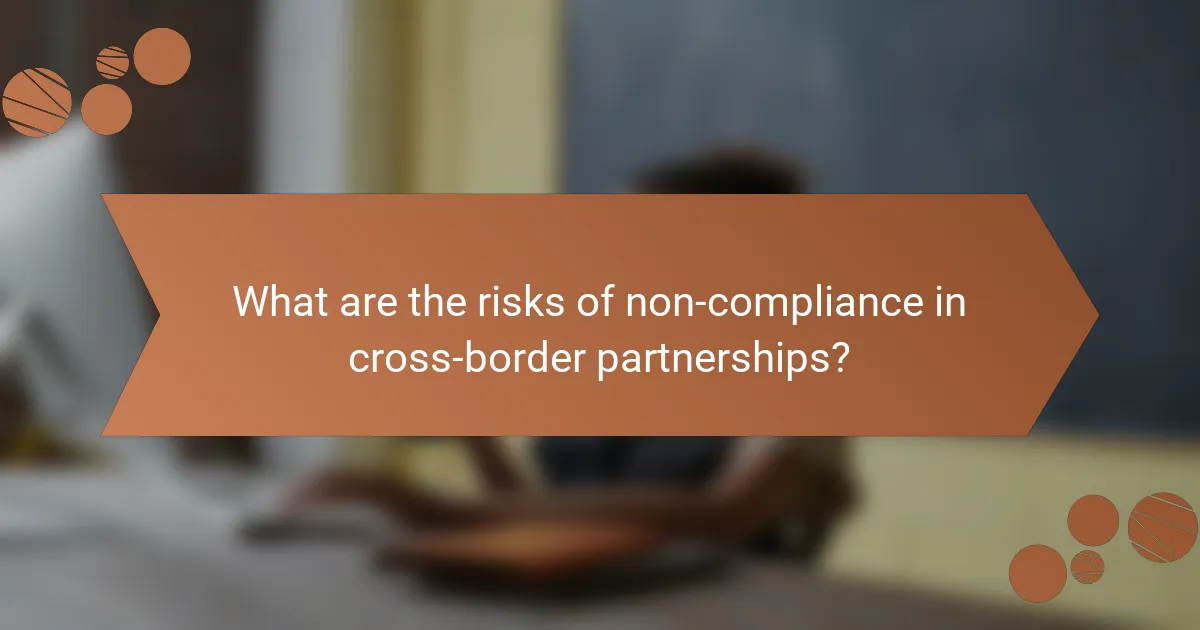
What are the risks of non-compliance in cross-border partnerships?
Non-compliance in cross-border partnerships can lead to significant legal, financial, and reputational risks. Organizations must understand these risks to protect their interests and ensure smooth international operations.
Legal penalties
Legal penalties for non-compliance can vary widely depending on the jurisdiction and the specific regulations violated. These penalties may include fines, sanctions, or even criminal charges against responsible individuals. For example, a company operating in the European Union could face fines amounting to millions of euros for breaching data protection laws.
To mitigate these risks, businesses should conduct thorough legal reviews and ensure adherence to local laws in each country they operate in. Regular compliance audits can help identify potential issues before they escalate into legal problems.
Financial losses
Financial losses resulting from non-compliance can be substantial, potentially reaching tens of thousands to millions of dollars. These losses may stem from fines, legal fees, or the costs associated with rectifying compliance failures. Additionally, businesses may lose out on lucrative contracts or partnerships due to a tarnished compliance record.
To avoid financial pitfalls, companies should invest in compliance training for their teams and establish clear protocols for monitoring regulatory changes. Proactive financial planning can help cushion the impact of any unforeseen compliance issues.
Reputation damage
Reputation damage is a critical risk associated with non-compliance, as it can lead to a loss of customer trust and market position. Companies found to be non-compliant may face public backlash, negative media coverage, and a decline in customer loyalty. This damage can take years to repair and may result in decreased revenue.
To protect their reputation, businesses should prioritize transparency and ethical practices in their operations. Engaging with stakeholders and communicating compliance efforts can help rebuild trust and demonstrate a commitment to responsible business practices.
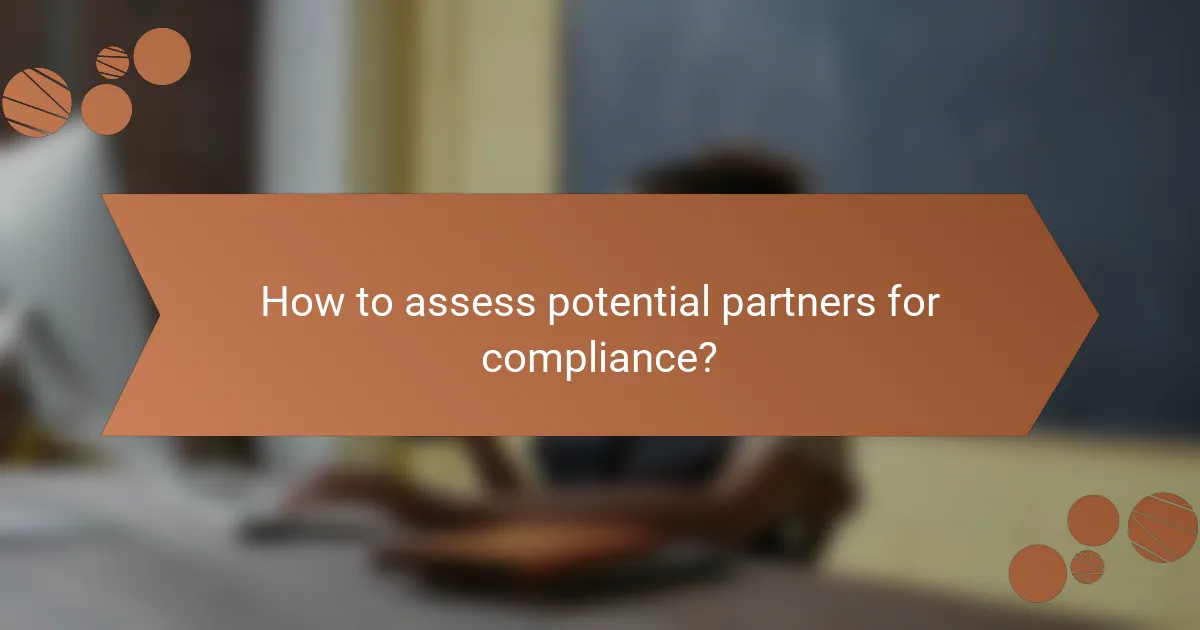
How to assess potential partners for compliance?
To assess potential partners for compliance, start by evaluating their adherence to relevant legal standards and regulations in your industry. This involves examining their operational practices, financial records, and any past compliance issues to ensure they align with your organization’s requirements.
Due diligence processes
Due diligence processes involve a comprehensive review of a potential partner’s business practices, financial health, and compliance history. Key steps include gathering documentation, conducting interviews, and verifying information through third-party sources. This process helps identify any red flags that could pose risks to your partnership.
Consider using a checklist to guide your due diligence, focusing on areas such as regulatory compliance, financial stability, and reputation. For example, reviewing a partner’s past legal disputes or regulatory fines can provide insight into their commitment to compliance.
Compliance audits
Compliance audits are systematic evaluations of a partner’s adherence to applicable laws and regulations. These audits can be conducted internally or by third-party firms and typically involve reviewing policies, procedures, and records to ensure compliance with industry standards.
When planning a compliance audit, establish clear objectives and criteria for evaluation. Regular audits can help identify areas for improvement and ensure ongoing compliance. It’s advisable to schedule these audits annually or biannually, depending on the nature of the partnership and regulatory requirements.
